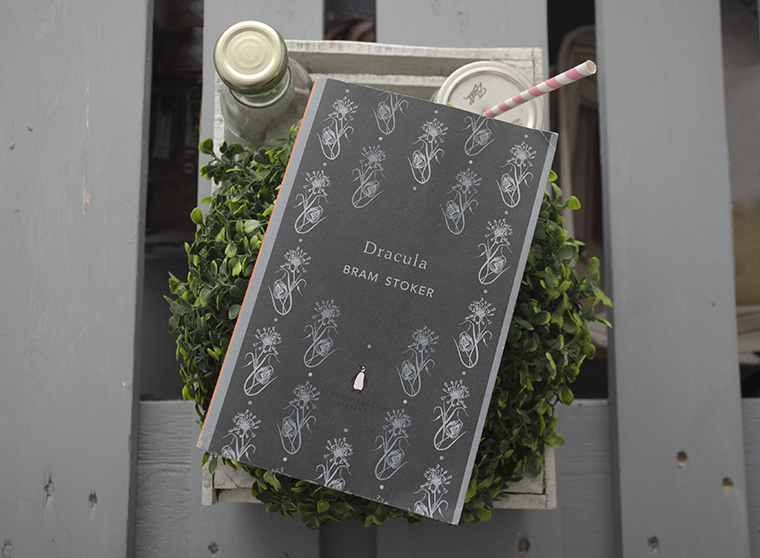Hey friends! As many of you know (and all of you should by now), I run an online book club here on the blog; the main goal is to find cool novels to share with you and, also, to prove a point that you can be into fashion and read more than magazines and self-motivation stuff. For this review, I chose to read a classic among classics and, believe me, it was worth it. Book Club #27 is Dracula, by Bram Stoker.
// ¡Hola amigos! Como muchos de ustedes saben (y ya todos deberían saber a estas alturas), llevo un club del libro online aquí en el blog; la meta principal es encontrar novelas buenas para compartir con ustedes y, además, probar que te puede gustar la moda y leer cosas más allá de revistas y cosas de ayuda personal. El book club #27 es Dracula, de Bram Stoker.

A novel becomes a classic when it manages to transcend, to deliver a strong impact on an audience and make them immerse into the world an author has created within the pages of a book. Dracula, by Bram Stoker, is one of the most iconic novels in the world and, although it wasn't that successful when it came out in 1897 nor it wasn't the first novel about vampires, it managed to stay relevant and be the first work that comes to mind when people talk about vampirism (except maybe for Twilight, but you can't compare those two at all)...
One of the things that distinguishes this novel from many others is that it's told mainly in journals; instead of having a narrator overviewing everything, we get glimpses of the events happening through entries inside the journals of different characters of the novel. Dracula is a mystery novel, a thrilling action piece, that tells the story of a mysterious Count from Transylvania, how his influence affects a group of people and how terror can reign over a person's life. Somehow, you always feel uneasy about something while reading it, it's very clever.
As the plot progresses (and I don't want to tell you much about it), several clues are dropped that allow the readers to deduce that Count Dracula is, indeed, a vampire. For us, it only takes a name to guess that but transport yourselves back to the 1800s, where Dracula and vampire were not associated with each other. That's the grand beauty of this book: it transports you to that Victorian era and makes you feel very connected with each character because you're reading their journals and private letters. When people say that you should read the classics, it's because they are worthy of being called that and Dracula is magnificent in its own sense: it feels dark, twisted, nostalgic and perfectly written.
// Una novela se convierte en clásico cuando logra trascender, dar un fuerte impacto a una audiencia y sumergirla en el mudo que un autor crea dentro de las páginas de un libro. Dracula, de Bram Stoker, es una de las novelas más irónicas del mundo y, aunque no fue tan exitosa cuando salió en 1897 ni fue la primera novela de vampiros, logró mantenerse relevante y ser el primer trabajo en que se piensa cuando la gente habla de vampirismo (exceptuando quizá Crepúsculo, pero no hay punto de comparación)...
Una de las cosas que distingue a esta novela de muchas otras es que se cuenta principalmente en diarios; en lugar de tener un narrador que ve sobre todo, obtenemos pequeños vistazos de los eventos que suceden a través de entradas en los diarios de distintos personajes de la novela. Dracula es una novela de misterio, una pieza emocionante de acción, que cuenta la historia de un misterioso Conde de Transilvania, cómo su influencia afecta a un grupo de personas y cómo el terror puede reinar sobre la vida de alguien. De cierta forma, siempre sientes que algo está mal cuando la lees, está llena de astucia.
Conforme la trama progresa (y no les quiero contar mucho al respecto), muchas pistas son arrojadas para que los lectores comiencen a deducir que el Conde Dracula es un vampiro. Para nosotros, sólo se necesita un nombre para adivinar eso pero transpórtense a los 1800s, cuando Dracula y vampiro no eran palabras asociadas entre sí. Ahí yace la gran belleza de este libro: te transporta a esa era Victoriana y te hace sentir muy conectado con cada personaje porque estás leyendo sus diarios y cartas privadas. Cuando la gente dice que hay que leer los clásicos, es porque son dignos de ser llamados así y Dracula es magnífico en su propio sentido: se siente obscuro, trastornado, nostálgico y escrito perfectamente.

If you want to get Dracula with free worldwide shipping, visit Book Depository!
Love always,
Henry.

No comments:
Post a Comment
Hey, thank you very much for hitting the comment section. Let's keep it nice out here, okay? (: